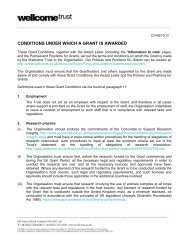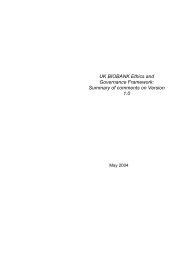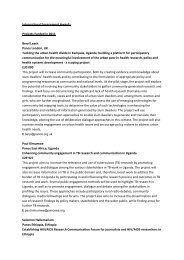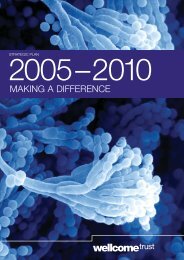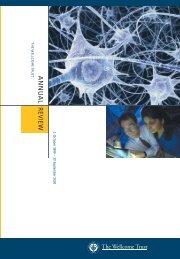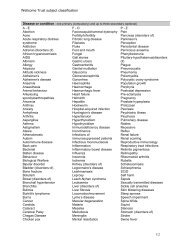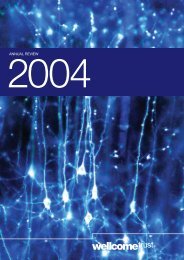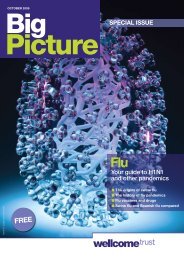Create successful ePaper yourself
Turn your PDF publications into a flip-book with our unique Google optimized e-Paper software.
DIRECTOR’S STATEMENT | 3<br />
Highlights<br />
of the year<br />
the health of a cohort of 500 000 people,<br />
aged between 40 and 69 at entry to the<br />
study. In 2008, this project recruited its<br />
100 000th participant, and is on track to<br />
complete recruitment by the end of 2010.<br />
Cancer is one of the most important of the<br />
chronic diseases; to help to combat this,<br />
the <strong>Trust</strong> and the <strong>Wellcome</strong> <strong>Trust</strong> Sanger<br />
Institute committed support to the<br />
International Cancer Genome Consortium,<br />
a global collaboration of researchers that<br />
will fully sequence thousands of cancer<br />
genomes to identify the key mutations<br />
involved in up to 50 types of cancer. Acting<br />
in the spirit of open collaboration, the<br />
Consortium will facilitate and encourage<br />
the rapid and free exchange of<br />
information to ensure that the global<br />
research community avoids any<br />
duplication of effort while building this<br />
body of knowledge.<br />
The Sanger Institute is playing a leading<br />
role in another international collaboration,<br />
the 1000 Genomes Project, an effort to<br />
sequence the genomes of more than<br />
1000 people from all over the world. This<br />
will create a more detailed and medically<br />
useful catalogue of human genetic<br />
variation than is currently available, which<br />
will be of critical importance for future<br />
studies of the genetic basis of variation in<br />
health and disease.<br />
Genetic variations are also the subject of<br />
another large international project. In a<br />
follow-up to the <strong>Wellcome</strong> <strong>Trust</strong> Case<br />
Control Consortium – one of the highlights<br />
of the 2006/07 Annual Review – we<br />
launched the largest ever study of the<br />
genetics of common diseases. These<br />
genome-wide association studies will<br />
involve researchers from at least 60<br />
international institutions, analysing DNA<br />
samples from 120 000 people – a larger<br />
sample than any previously studied. This<br />
will provide greater sensitivity to uncover<br />
subtle yet medically important genetic<br />
variations involved in 25 diseases.<br />
Genomics continues to capture the<br />
public’s imagination. Inside DNA: A<br />
genomic revolution is a five-year travelling<br />
exhibition that launched in Bristol and is<br />
moving to Newcastle, Glasgow and<br />
Liverpool. The partnership between<br />
Ecsite-uk, the UK Network of Science<br />
Centres and Museums, the At-Bristol<br />
science centre and the Sanger Institute<br />
will enable the public to engage with the<br />
science and scientists involved in<br />
genomics research, and challenge their<br />
perceptions of the subject.<br />
Such public engagement initiatives seek<br />
to form a common understanding and<br />
bring together people from different<br />
backgrounds. Another of our successful<br />
projects this year was Science in Film,<br />
which brought eight film makers and<br />
eight scientists together to plan, shoot<br />
and edit short films inspired by science.<br />
The resulting films can be seen on our<br />
website at www.wellcome.ac.uk/<br />
broadcast.<br />
4 5 64<br />
Meanwhile, <strong>Wellcome</strong> Collection<br />
continues to go from strength to strength,<br />
producing a programme of fascinating<br />
and often challenging exhibitions and<br />
events. The exhibition that, to my mind,<br />
brought home the changing nature of<br />
human disease was Skeletons:<br />
London’s buried bones (see www.<br />
wellcomecollection.org/skeletons),<br />
produced in collaboration with the<br />
Museum of London’s Centre for Human<br />
Bioarchaeology. Seeing 26 skeletons<br />
from Roman, early medieval and late<br />
medieval London gave a glimpse at the<br />
wide array of illnesses people have<br />
suffered and died from over the last<br />
2000 years. Some of these diseases<br />
– notably smallpox – have been<br />
consigned to history, while others are<br />
now rare or readily treated with modern<br />
antibiotics. But tuberculosis was one of<br />
the great dangers of the past, just as it is<br />
today in many countries. We hope that<br />
through medical research, this and many<br />
other diseases can join smallpox as<br />
historical footnotes.<br />
Mark Walport<br />
Director<br />
January 2009<br />
• Self-renewal is found to be the ‘default<br />
setting’ for embryonic stem cells.<br />
• Genome-wide association studies<br />
shed light on conditions such as<br />
Crohn’s disease and schizophrenia.<br />
• Brain imaging reveals distinctive<br />
brain activity in people with mental<br />
disorders.<br />
• Dementia is found to be much more<br />
common than thought in low- and<br />
middle-income countries.<br />
• Malaria researchers help INTERPOL<br />
to track down drug counterfeiters in<br />
South-east Asia.<br />
• A new TB vaccine generates<br />
powerful immune responses in<br />
African clinical trials.<br />
• Survivors of the 7/7 London bombings<br />
benefit from psychological treatments<br />
for post-traumatic stress disorder.<br />
• <strong>Wellcome</strong> Collection attracts<br />
300 000 visits in its first year of<br />
opening.<br />
• Project Enthuse is launched to<br />
provide UK science teachers with<br />
even more continuing professional<br />
development opportunities.<br />
• <strong>Trust</strong> promotes informed debate<br />
during updating of the Human<br />
Fertilisation and Embryology Act.



